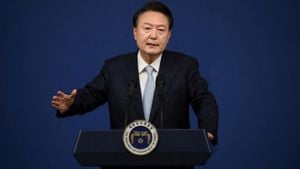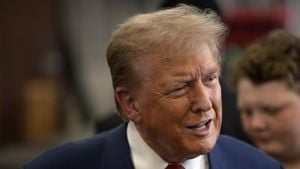France is currently standing on the edge of political upheaval as the government led by Prime Minister Michel Barnier faces the possibility of being brought down by no-confidence votes scheduled to take place soon. This potential collapse would mark a significant moment for President Emmanuel Macron, who would have to navigate the murky waters of political instability with over two years left in his presidential term.
The spotlight is on two motions of no confidence, instigated by both the far-right National Rally (RN), headed by Marine Le Pen, and the left-wing alliance known as the Nouveau Front Populaire (NFP). This standoff is partly rooted in Barnier’s recent controversial maneuvering, wherein he invoked Article 49.3 of the French constitution to force through significant budget cuts without requiring MP approval.
Le Pen's RN expressed support for the left's motion, which could propel the vote to success. While Barnier, holding steadfast, expressed optimism about his government's survival, stating, "I want this and it is possible," the underlying tensions present formidable challenges.
The national assembly’s current configuration emerged from a snap election called by Macron earlier this year, aiming to consolidate his grip on power. Instead, it resulted in the RN becoming the largest party, causing the assembly to reflect deep divisions within French politics, prompting fears of instability.
Concerns loom large over the consequences of the government’s potential collapse, particularly as Macron wraps up another state visit, this time to Saudi Arabia. Many critics are demanding clarity from Macron, who has been accused of remaining silent amid the crisis. Olivier Faure, the head of the Socialist Party, argued, "How can he leave the French people in this uncertainty just before Christmas?" This sentiment reflects the unease settling across France as the year winds down.
Historical insights shed light on the gravity of the situation. If Barnier's government crumbles, it would be the first successful no-confidence vote since Georges Pompidou faced one back in 1962, setting the stage for potentially the shortest tenure for any Prime Minister since 1958, when the current Fifth Republic was established. Barnier’s government, having lasted only three months, is precariously teetering.
There’s speculation surrounding who could assume the role of prime minister should Barnier be removed from power. Defense Minister Sébastien Lecornu, along with other centrist allies, are touted as potential candidates to step up during this tumultuous period, even as the left has its contenders, like former Socialist premier Bernard Cazeneuve. Yet, the road remains murky, with Macron holding onto power as calls for his resignation circulate, largely dismissed by the president as part of “political fiction.”
The heavy stakes play out amid broader concerns for public order across France, with anticipated public sector strikes complicate matters. Market reactions also reflect nervous sentiments as French borrowing costs begin to parallel those of Greece, prompting questions about France’s fiscal health. The left-wing daily Liberation has placed the blame squarely on Macron's shoulders, calling attention to what many see as his failing strategies.
Analysts suggest the fallout of this political tussle could unearth vulnerabilities within Le Pen's RN, who, by siding with the NFP, risks alienation among moderate conservatives. Even as they are positioned as the voice of the discontented, party leaders remain encumbered by their own legal troubles and party reputation challenges.
The RN’s rising shadows of influence echo the dire lessons from the past and draw comparisons to times of political turmoil within other European nations, such as Greece during its debt crisis. Some observers worry this increasing chaos mirrors historical precedents where governments were overtaken by invocations of far-right populism, leaving socio-economic consequences difficult to unearth and recover from.
Despite the unfortunate narrative prevalent today, critics are vehement against the rhetoric surrounding (or the logical fallacy of) collusion between opposing political factions. The twisting political climate can be likened to intertwining narratives, where lost alliances run the danger of paving paths toward confrontation rather than compromise.
Analysts maintain prudent caution against the prospect of early elections, often framed with the urgency surrounding the looming crises. But Le Pen’s strategy to orchestrate disorder is underscored by her pressing need to appeal to continuity beyond the impending criminal trial evaluation due March next year, which could curtail her political aspirations.
Prime Minister Barnier, on the other hand, seems to reflect on the broader themes of governance gone awry. Their choices to align with the far right have yielded unsatisfactory outcomes, inching closer to what may become lore, should they fail to navigate through these turbulent periods without substantial reasoning.
This political drama presents many unanswered questions. Does maintaining power necessitate the compromise of principles? Can the far-right be navigated without emboldening their more extreme agendas? And, most critically, what will France look like should Barnier’s government fall?
France's ever-evolving political conflicts create rippling effects, extending beyond mere party lines. They challenge the very facades of governance and populism, all etched within the timeline of French history as the government inches to potentially rewrite its own narratives. This modern political saga serves as both stark cautionary tale and case study, shedding light on what becomes of nations caught between colliding ideologies, inner turmoil, and the light-threatening shadows of extremists.
The stage is set; the players are uncertain. What remains is whether France's political play can stabilize or continue to unravel before the nation’s eyes.



